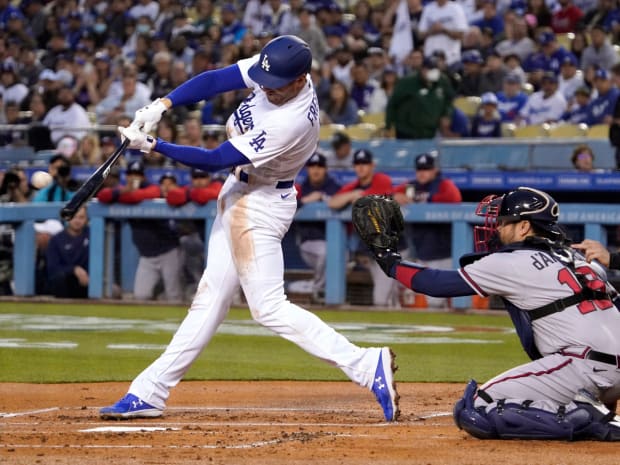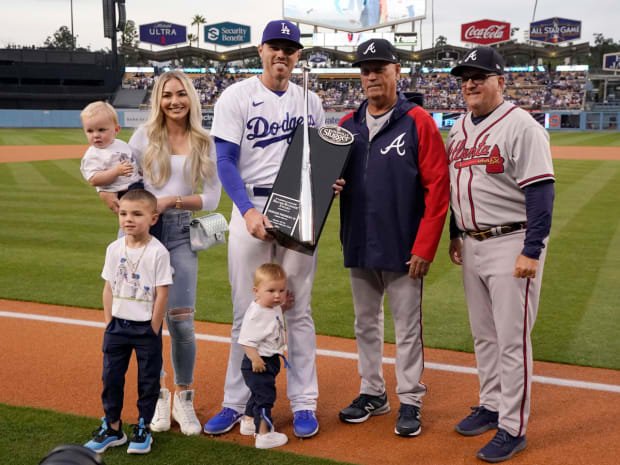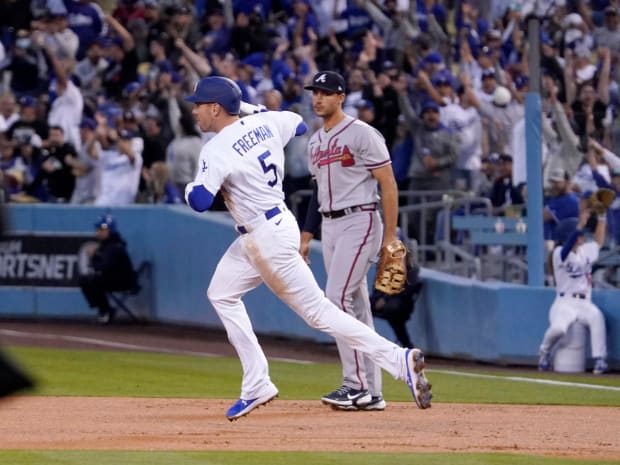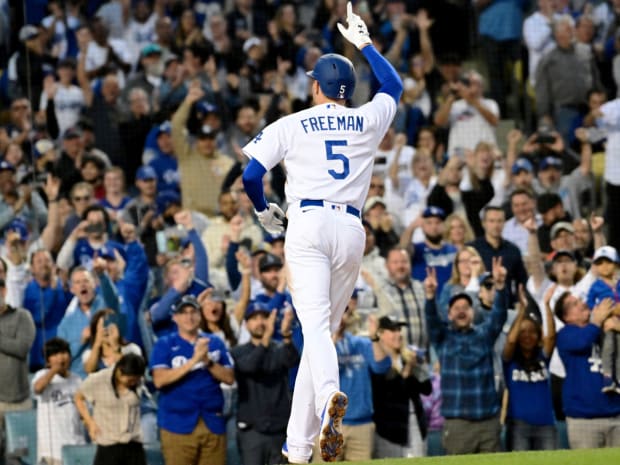Welcome to The Opener, where every weekday morning during the regular season you’ll get a fresh, topical column to start your day from one of SI.com’s MLB writers.
LOS ANGELES — The first home run of the rest of Freddie Freeman’s career came against the only team he had ever known until this year, and against the friends who moved him to tears upon seeing them before the game. Freeman had not seen most of his World Series champion Braves teammates since their victory parade. Now a Dodger, either because he overplayed his hand or because the Braves saw an opening to get the next Freeman (most likely both), he emphatically turned the page by swatting his first homer as a Dodger in his first at bat against his former team.

AP Photo/Mark J. Terrill
Dodgers teammate Trea Turner had joked with Freeman before the game that he had waited until the team’s 10th game to go yard because that would be his first against the only organization he knew for 15 years. Turner was prophetic, but Freeman wasn’t buying the only-in-Hollywood story line on an emotional night for him.
“Being able to see them again,” Freeman said about his friends and former teammates. “That is the story line for me.”
Freeman’s home run jumpstarted the Dodgers to their seventh straight win, 7–4. They look as loaded as you would expect a team with 12 All-Stars, the most in baseball and as many as the Guardians, Reds, Orioles, Pirates and A’s combined. Two MVPs hit homers for the Dodgers (Freeman and Cody Bellinger), another scored a run (Mookie Betts) and a fourth was the winning pitcher (Clayton Kershaw). House of Gucci didn’t have an ensemble cast like this.
There is another side to the coin that helps explain why Freeman’s second act of his career will happen as a Dodger. And that, too, was evident in the same game. Matt Olson, the Braves’ younger replacement for Freeman at first base, swatted three more hits. He is off to the greatest start in the history of the Atlanta Braves franchise: a .566 OBP over his first 53 plate appearances.
Freeman, 32, and Olson, 28, will be compared and contrasted for the next six years, the length of Freeman’s contract with the Dodgers. The Braves, upon trading for Olson from Oakland, gave Olson an eight-year contract worth $168 million. Because Freeman deferred $57 million of his $162 million from the Dodgers, his current value is “only” about $145 million.
No matter how the Freeman vs. Olson argument plays out, both sides wound up with a good deal. Atlanta lost a legacy player, but they gained a guy on the ascent who could be Freeman in his prime. Los Angeles got a plug-and-play superstar who is back home in Southern California with no regrets and, until now at least, is a better situational hitter than Olson.
“What I’ve learned about Freddie,” Dodgers manager Dave Roberts said, “is that he is very precise about how he goes about his work and that he’s very emotional. I say that in a very positive way. He cares about family and he cares about people. You cannot help but see that right away, and I think that’s why people are drawn to him.”

AP Photo/Mark J. Terrill
The emotional part was evident before the game when Freeman admitted to crying about four times as he reunited with his former teammates—or how excited he grew when describing a postgame Easter egg hunt the Dodgers arranged on the field for players’ kids after the game Sunday.
Make no mistake, Freeman was hurt when the Braves slow-played him once he reached free agency. Freeman had turned down a five-year, $135 million offer from Atlanta around the All-Star break, a smidgen better than the $130 million extension the Cardinals had given Paul Goldschmidt. No headway was paved before the Dec. 2 lockout. If Freeman wanted top value and to stay with the Braves, it was not going to happen.
Chipper Jones, the former Brave, would say he disagreed with the way Freeman and his agents let a deal get away. “If you want to play in Atlanta, you play in Atlanta,” Jones said.
Freeman was irked when Braves GM Alex Anthopoulos said he cried when no deal was reached. Then Freeman and Anthopoulos spoke for three hours over Face Time. Monday marked the first time since the victory parade they met face to face. They met in the Braves’ dugout more than five hours before the game.
“Hello, world champion,” Freeman said to him.
They hugged, then moved their conversation to a hallway behind the dugout so they could speak without cameras catching them. They did not talk about the failed negotiations, such as they were. Freeman had closed that chapter with that three-hour call.
“That was the closure that I needed,” Freeman said. “Now it’s just happiness in seeing him and friendship, because we spent so much time together over the last four years trying to win a World Series. And to be able to accomplish that … it was just good to see him.”
Both Freeman and the Braves have moved on. Two years ago, Olson hit .195 and struck out 31% of the time, the kind of bottom Freeman never saw in his worst years. But Olson corrected the attack angle of his swing, and since then has slashed .280/.384/.549 for a .933 OPS—precisely the same OPS Freeman had at the same age (27–28). Like Freeman in Southern California, Olson, who grew up in Lilburn, Ga., rooting for the Braves, is happy to be home.
As the Braves began to gather for pregame stretching, Freeman—who spent more time hanging out with the Braves than the Dodgers pregame—made sure to seek out Olson. They spoke for a few minutes. Asked what he told Olson, Freeman said, “I told him he could not be in a better place. It’s a special place with special people over there. But I think he already knows that.”

AP Photo/Mark J. Terrill
Likewise, even if Freeman had intentions of being a lifelong Brave, he always had a soft spot for Southern California. This is home, and truth be told he was telling people as long ago as last summer the Dodgers or Angels would be a perfect landing spot if the Braves did not offer him the contract he wanted. He lives in Corona del Mar, 47 miles from Dodger Stadium, and rents a place in Studio City (12 miles away) during the season.
Freeman was a second-round draft pick in 2007 out of El Modena High School in Orange, Calif. And if you thought the perfect scenario was for Freeman to remain a Brave for life, you should know about a scene that took place on his high school baseball field just one week before he signed with the Dodgers.
“I hit .177 last year in the first few weeks,” Freeman said, “so during the lockout I figured I better do something different to make sure that didn’t happen again.”
Freeman returned to his high school baseball field to take batting practice. The person throwing to him was his father, Fred. And the person shagging in the outfield was his grandfather.
“How cool is that?” Freeman said. “My grandfather is 86 years old. I threw him a ball and he didn’t catch it. So he throws his glove down and goes, ‘That’s it. I can’t do this any more.’ So I say, ‘You’re 86 years old, Grandpa! It’s okay when you’re 86!’”
And then Freeman laughed, not so much at the joke but at the sweetness of the memory of his dad throwing him B.P. on his high school field while his grandfather chases his hits in the outfield.

Richard Mackson/USA TODAY Sports
Monday night, after Freeman crossed home plate with the first home run of the rest of his career, he pointed to a loge suite at Dodger Stadium that included his wife, his three children, his father and his grandfather. They had been there since two hours before the game. That was the moment you understood that maybe Freeman was not meant to be a Brave for his entire career, but that something bigger was calling him. He is home.







